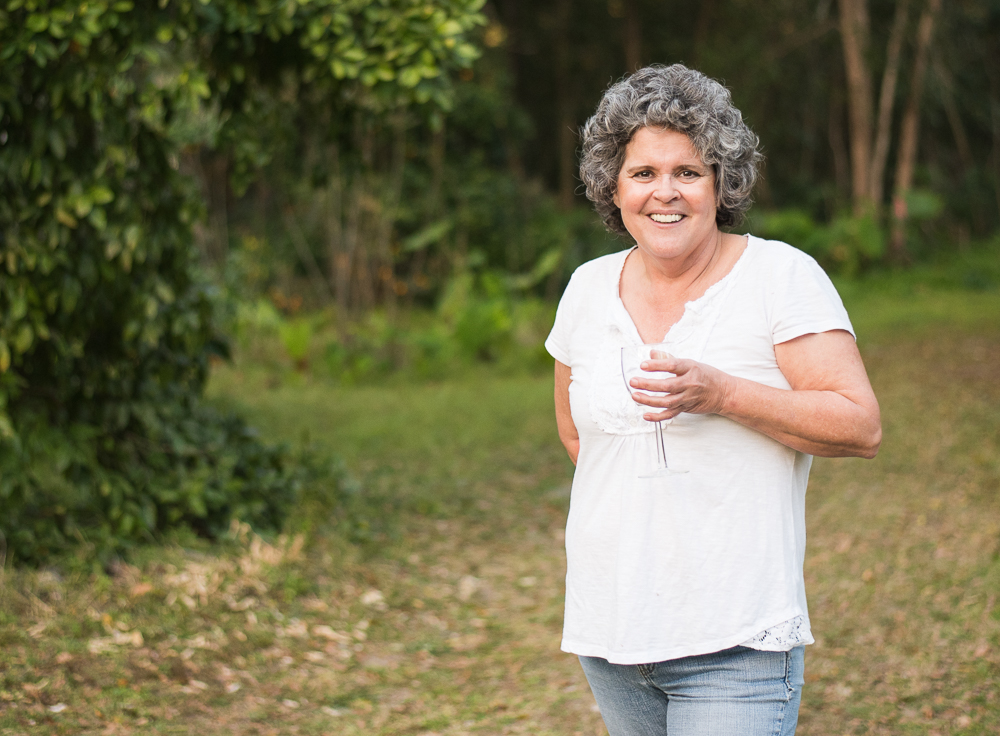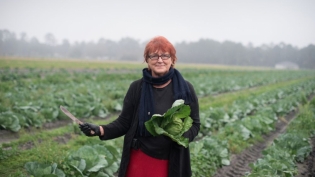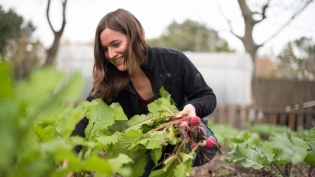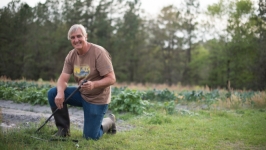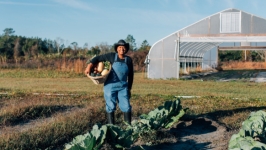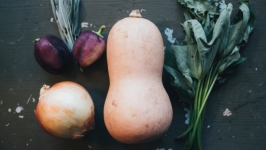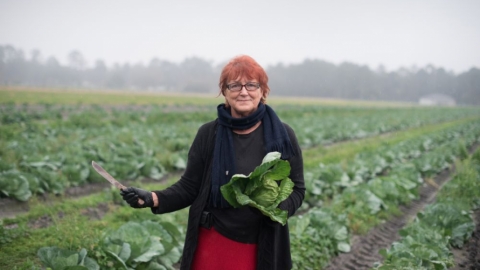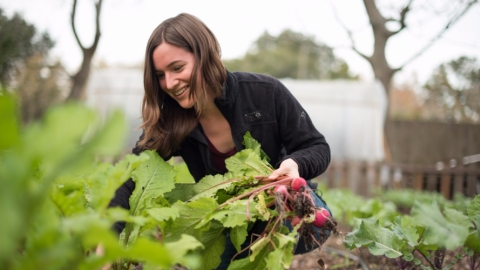Alina Gonzalez on Learning to Farm
A background in education did little to prepare Alina Gonzalez to take on the role of co-owner at Urban Folk Farm. Based on her previous career, however, she knew that learning as much as she could about the ins and out of farming was going to put her and her husband in a better position to run their small business. Here Alina chats about her new role, which includes "A little bit of some things and a lot of other things in regards to farming and small business!"
You don't come from a traditional background in farming. Can you tell us little bit about why you started farming, how you got into it, and how long you've been doing it?
No, farming certainly isn't my background whatsoever! Bugs, dirt, creepy crawlies had no appeal to me. My background is in education. I was a teacher, a reading coach and a curriculum support specialist with Miami-Dade County Public Schools for 20 years. I loved teaching students, parents and other teachers but the business model approach to education really put me off. I believe in accountability but I never dreamed that schooling would become one gigantic test year in and year out. I truly believe that we were doing a disservice to kids because learning should be about understanding the big picture not just tiny snippets of a student's areas of weaknesses. It was all about data. The data does tell you a lot but the bottom line is the system wanted to produce identically perfect widgets when teachers were dealing with perfectly irregular and different people. I'll take people to widgets any day!
Initially my husband, Simon Hoek Spaans, and I were going to just move out of Miami to Jacksonville, find different jobs and live closer to our kids but somewhere along the line we sat down and started brainstorming our strengths and weaknesses and from this came the idea to start a care farm. My brother-in-law has had terrific success with the concept in Holland-he was knighted this past spring!
Why were you drawn to NE Florida, in particular?
Jacksonville was the ideal area for me because it had a major university, hospitals, and beaches. After spending about 2 years researching real estate in Jacksonville, visiting and looking into different areas we short-listed 5 properties and arranged to see them with our wonderful realtor, Tom Moore. On the Thursday before we left, this property appeared on one of my lists. We added it to the other 5 and it was the first property we saw together. After a very comical day with Tom, Simon and I decided to buy the property. We put an offer in on Monday. Someone had already made an offer but we prevailed by offering the owners to name a program or a garden after the recently deceased husband once our care farm was established. I also love to drive back roads and NE Florida has loads of these wonderful byways!
Once we moved to Jacksonville in March of 2014,the question then became, establish farm or care farm first. We opted for farm since the basis for the care farm would be the farming chores and the environment.
What's the most challenging part of farming small in Northeast Florida?
The challenges of farming in NE Florida started with one big problem - absolutely no background knowledge! NE Florida is full of wonderful resources available to farmers and small business owners. We availed ourselves to all that was offered! UF IFAS had classes and an amazing website, Florida Organic Growers had workshops, SBDC had classes for non-profits and for profit business, the Jacksonville Chamber, SCORE were some of the resources we used to learn at little or no cost. We hit the jackpot moving to Jax. The people are terrific. The support is amazing!
Weather and those creepy crawlies are a huge challenge in farming. The first time, Simon readied the field. Everything looked beautiful with plastic covered rows and mulched paths between rows, until we discovered that for every seedling planted 10 or more did not survive 24 hours! MOLE CRICKETS!!!!!! We had to undo all the sweat equity that had gone into our first planting and redo everything! When Simon finished a row, we would wait a half an hour to start catching mole crickets before they burrowed and then we'd feed those nasty creatures to the chickens.
I have and still spend hours and hours researching everything I didn't understand and/or know about plants, weeds, bugs and anything else related to farming. I think as with anything else, it will become easier with more experience.
What's one the thing most people don't know about farming life that might surprise them?
The most surprising thing has been all the nature that abounds at our location. We have deer and turkeys, quail, hummingbirds, owls, bats. I've seen one coyote, been scared out of my mind by a rattlesnake and copperhead, found bear and some sort of cat tracks. Everyday is the same but some little part of nature has changed. One day the weeds will be in control and the next day you are looking at the most resplendent colors of weeds out of control. It is truly beautiful!
On average, how many hours a day do you spend working and what's a-day-in-the-life look like for you?
Farming is 24 hour a day business. Depending on the season, the weather, the day of the week. We do markets on the weekends and have farm stand hours during the weekdays. We send out a weekly email list to our customer base and as customers email order we harvest their produce hours before they come to pick up. So when we say farm stand please don't expect to see an actual stand with harvested vegetables losing vitality - expect to see a field full of living produce that you can take home sometimes only minutes after harvest! That's nutrient density!
Seeding, watering, planting, harvesting, weeding, repairing, organizing, planning, learning, bookkeeping, banking, marketing, selling are just some of the things we do regularly.
We talk a lot about seasonal ingredients and consumers, chefs, restaurants, artisans and farms working together as a "food system." What are some of the hurdles you face in trying to get your product to market?
The biggest hurdle is the fact that everyone claims to desire farm fresh produce but the reality is that these customers want the convenience of a grocery store. People are excited to visit the farm but don't seem to realize that by becoming a regular customer is the ONLY WAY small farms can continue to operate. Loving a romanticized ideal of farming is not the same as supporting a farmer. Our ultimate goal is to establish a care farming business model established so other small farmers will be able to join a network that will provide a second stream of income. If we could develop more small farms with reliable income streams from care farming, help people with needs in our community, alleviate some of the pains of our health care system, provide jobs, decrease our carbon footprint and continue to produce fresh nutritionally dense food, that would benefit us all in the end.
What really surprises me about the restaurant scene here is that there is no fresh produce market or hours within a market day specifically for chefs. We supplied 904 Restaurant while they were in operation and loved the fact that we came in the front door with our produce and were always introduced to patrons!
Finally -- what advice would you give to women who are interested in working on, or owning, a small farm?
Farming is really a labor intensive job. If you are planning to make all your income from a tract of land make sure that you have money to support yourself because selling vegetables on a small scale is difficult. Do all the background research on any property you are considering. Look into zoning, flood plains, ash sites, water availability, wells... The more you know the more prepared you will be. If you haven't farmed take classes, visit farms, apprentice with someone who is experienced, be a WOOFER for a while. If you have no business experience find all the resources available to you for little or no cost within your community. Plan and don't jump into something without really understanding the repercussions of what success or failure may mean.


